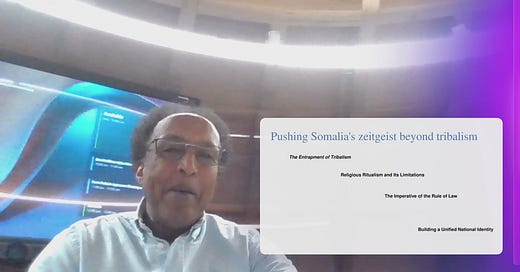Throughout world history, the temper of the times has been the zeitgeist of each generation. In today’s Somalia it is centered around tribal values, sometimes and in some places dressed in religious camouflage. This week am reflecting on what can be done to help push Somalia's zeitgeist beyond tribalism and a call for a national unity and rule of law.
Somalia's modern political and social landscape remains deeply entangled in historical tribal divisions and misguided and often dangerous religious rituals. While both tribal and religious identities play essential roles in shaping Somali society, their overwhelming influence has hindered the establishment of cohesive national identity and robust state structures. Somalia's future, however, lies not in the perpetuation of these divisive forces but in pushing its zeitgeist toward a higher plane of national unity, constitutionalism, and the rule of law. To build a prosperous, stable Somalia, the nation must transcend the limitations of tribalism and religious factionalism and focus on institutional governance, respect for the constitution, and concerted nation-building efforts.
The Entrapment of Tribalism : Tribalism has historically provided Somalis with social organization and collective identity, especially in the absence of a functioning state during the protracted civil war. However, tribalism, while offering protection, also entrenches divisions that make it difficult for the country to develop inclusive institutions. Tribal allegiances can undermine national unity, with political power often being distributed along clan lines rather than through merit or shared national interests. This distribution exacerbates corruption, as clan-based loyalties prioritize personal or group gains over national development.
In a modern context, tribalism presents significant obstacles to effective governance. Clan-based federalism, for instance, often fragments the state and creates conflicting centers of power, making the enforcement of national policies inconsistent. Moreover, the deep-rooted mistrust between clans hampers the possibility of establishing a shared vision for Somalia’s future. Political competition among clans for control of resources and governmental power leads to recurrent instability, stalling efforts at national development and progress.
Religious Ritualism and Its Limitations
Religious rituals in Somalia are another powerful element of identity that, while central to daily life, can act as a double-edged sword in the political realm. Islam plays a profound role in Somali society, and religious rituals can foster unity and social solidarity. However, when religion becomes a tool for political manipulation or when its influence dominates the political sphere to the exclusion of other governance principles, it risks alienating portions of society and stalling institutional development.
Radical factions, like Al-Shabaab, exploit religion as a tool for political control, often merging religious dogma with governance in ways that challenge the establishment of a secular and inclusive legal framework. Somalia's future demands a shift from an over-reliance on religious rituals as the primary basis for governance and instead embrace the universality of laws that respect human rights, diversity, and democratic values.
The Imperative of the Rule of Law
Pushing Somalia beyond tribalism and religious factionalism necessitates the establishment and reinforcement of the rule of law. The rule of law is essential for the development of a just society where citizens can expect fairness, accountability, and protection from arbitrary power. A functional state is one that ensures laws apply equally to all citizens, regardless of their clan or religious affiliations.
In Somalia, where the justice system is often fragmented and subject to local clan-based adjudication, it is imperative to develop a unified legal framework that is respected at both the national and local levels. The adherence to the rule of law also ensures that the state can manage disputes impartially and enforce contracts, which is essential for fostering economic growth and attracting foreign investment. Rule of law ensures that all Somalis, regardless of their background, have equal protection under the law and can contribute to nation-building in meaningful ways.
The Role of the Constitution
Somalia’s constitution offers a framework for this transformation. As a supreme document, it delineates the structure of government, the rights of citizens, and the duties of leaders. Yet, the constitution remains under-implemented, and its principles often take a back seat to tribal negotiations or religious edicts. For Somalia to move forward, there must be a collective respect for the constitution as the ultimate arbiter of political and legal processes.
The constitution provides a roadmap for federalism, but its provisions need to be strengthened and fully operationalized in ways that prevent it from being undermined by tribal interests. Constitutional reforms could also enhance inclusivity, particularly ensuring that marginalized groups, such as women and minorities, have representation and rights that are enshrined and protected. Respecting the constitution means more than paying lip service to its ideals; it requires a national commitment to follow its processes, uphold its principles, and resolve disputes through its mechanisms.
Building a Unified National Identity
The most urgent need for Somalia is to build a national identity that transcends tribal and religious divisions. This identity must be inclusive, allowing all Somalis to see themselves as part of a shared future. Nation-building efforts must focus on creating a sense of common purpose and fostering national pride, rooted in the idea that all citizens, regardless of clan or faith, have a stake in Somalia’s development.
Education plays a critical role in this process. Schools should teach civic values and the importance of national unity, equipping young Somalis with the knowledge and skills to contribute to the country’s future. Moreover, fostering inter-clan collaboration and dialogue, as well as promoting inter-religious tolerance, are key to dissolving the divisions that have plagued the country for decades.
For Somalia to realize its full potential, the country must push beyond the entrenched systems of tribalism and religious factionalism that have shaped its past. Embracing the rule of law, respecting the constitution, and focusing on nation-building are the pillars on which Somalia’s future must be built. The Somali people, in collaboration with their leaders, must adopt a mindset that looks beyond clan allegiances and religious divides and prioritizes the common good. In doing so, Somalia can cultivate a stable, prosperous, and unified state, capable of engaging meaningfully in global development and securing a better future for all its citizens.
Comments, feedback as always welcome.













Share this post